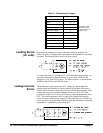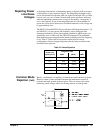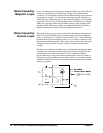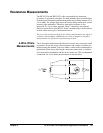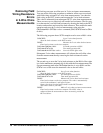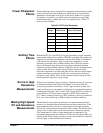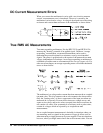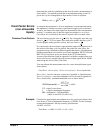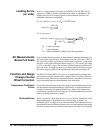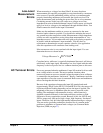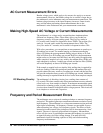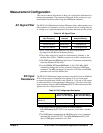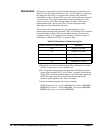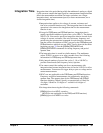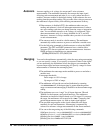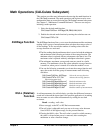
34 HP E1312A/E1412A Multimeter Application Information Chapter 2
Loading Errors
(ac volts)
In the ac voltage function, the input of the HP E1312A and HP E1412A
appears as a 1M
Ω
resistance in parallel with 100pF of capacitance. The
cabling that you use to connect signals to the multimeter will also add
additional capacitance and loading.
For low frequencies where :
For any frequency:
R
s
= source resistance
f = input frequency
C
in
= input capacitance (100pF) plus cable capacitance
AC Measurements
Below Full Scale
You can make the most accurate ac measurements when the multimeter is at
full scale of the selected range. Autoranging occurs at
≤
10% and
≥
120% of
full scale. This enables you to measure some inputs at full scale on one range
and 10% of full scale on the next higher range (e.g., 10V on the 10V range
or 10V on the 100V range). The accuracy will be significantly different for
these two cases. For highest accuracy, you should specify the range to assure
the lowest range possible for the measurement (this turns autorange off).
Function and Range
Change Internal
Offset Correction
The HP E1312A and HP E1412A uses an ac measurement technique that
measures and removes internal offset voltages when you select a different
function or range. The next two sections discuss two ways these offset errors
can be generated and how the multimeter deals with them.
Temperature Coefficient
Errors
If you leave the multimeter in the same range for an extended period of time,
and the ambient temperature changes significantly (or if the multimeter is
not fully warmed up), the internal offsets may change. This temperature
coefficient is typically 0.002% of range per °C and is automatically removed
when you change functions or ranges.
Overload Errors When you specify a new range in an overload condition, the internal offset
measurement may be degraded for the selected range. Typically, an
additional 0.01% of range error may be introduced. This additional error is
automatically removed when you remove the overload condition and change
function or range; the error remains if the function or range is not changed.
(f R
s
× ) 15(10
6
)
Ω
Hz:•≤
Error (%) =
-100 R
s
×
R
s
+ 1M
Ω
----------------------
Error (%) = 100 x [
1
1 + (2
π f C
in
(1M
Ω
)R
s
1M
Ω
+R
s
-------------------------)
2
⋅
----------------------------------------------------------------
(
1M
Ω
1M
Ω
+R
s
--------------------
)-1]



